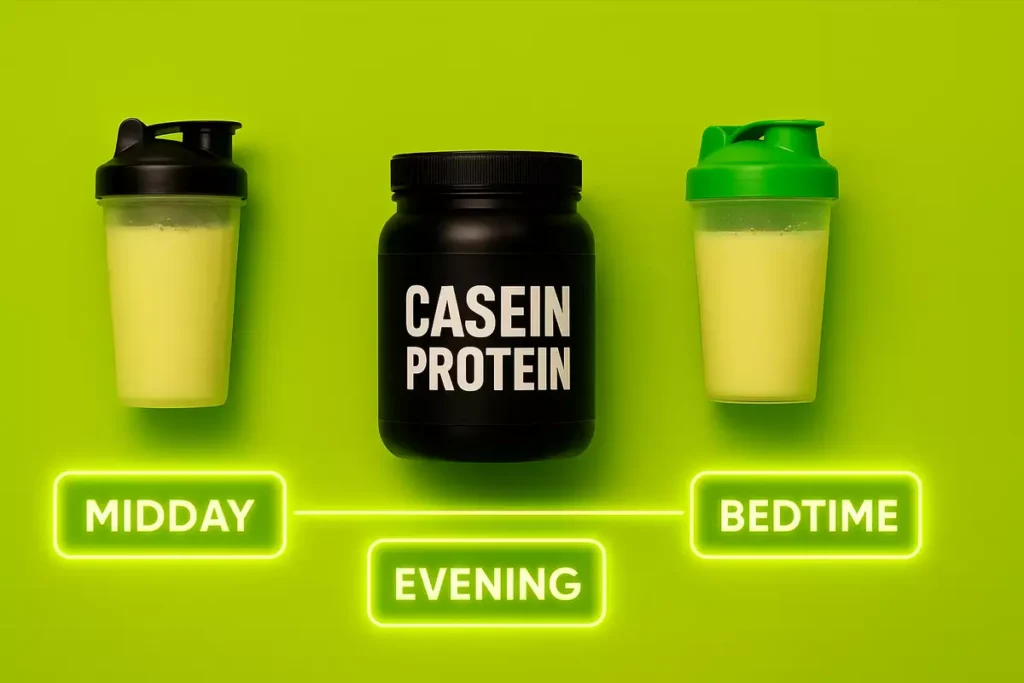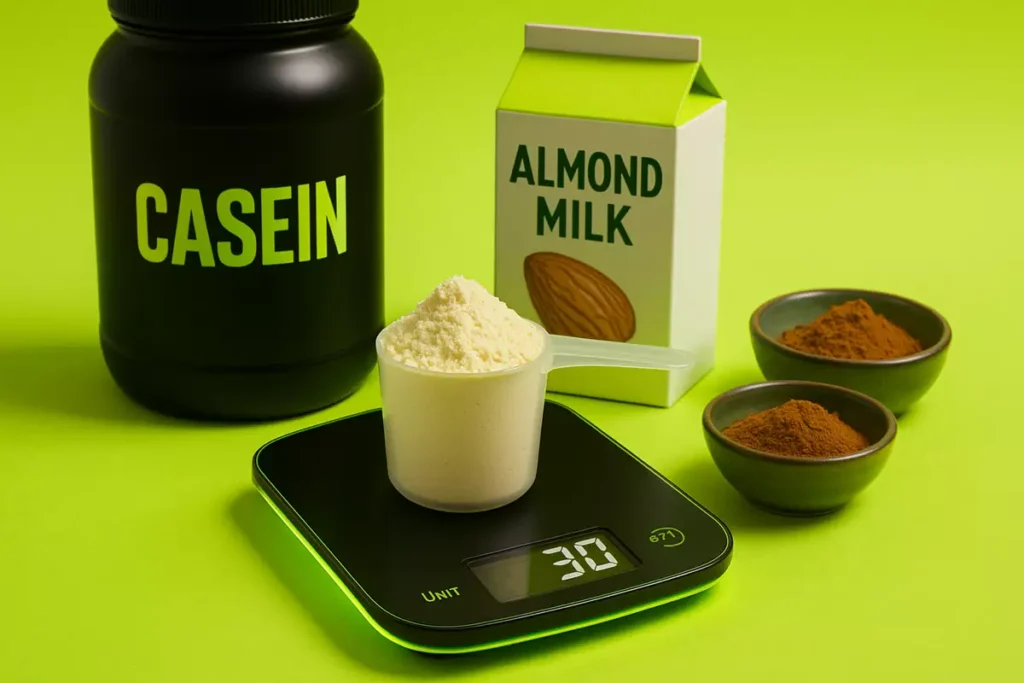Struggling to build muscle despite eating clean and training hard? The answer might not be in your workouts — but in what you drink before bed.
If you’re not taking casein protein at the right time, you could be missing out on one of the most effective, science-backed strategies to grow and protect lean muscle while you sleep.
In this article, you’ll discover exactly when to take casein protein for maximum muscle growth, why timing matters, and how to use it like a pro for serious gains.
Table of contents
- When Should You Take Casein for Muscle Growth?
- Why Casein Works: Slow-Digesting Protein Explained
- Nighttime Casein: The Gold Standard for Growth
- What If You Miss Nighttime? Other Ideal Times to Take Casein
- Casein vs Whey: Timing Makes the Difference
- Best Dosage and How to Take It for Results
- Common Mistakes to Avoid with Casein Timing
- Final Verdict: Make the Most of Your Casein
When Should You Take Casein for Muscle Growth?
If your goal is to maximize muscle growth and recovery, the best time to take casein protein is 30 to 60 minutes before bed.
This timing works like magic because casein digests slowly, feeding your muscles with amino acids throughout the night when your body goes into repair mode.
That means less muscle breakdown, better recovery, and more gains — especially if you’re in a calorie deficit or training hard. I’ve personally used casein this way for years, and it’s become a staple in my evening routine.
During a 10-week cut, I relied on it every night, and I noticed a big difference in my morning energy and soreness levels compared to previous cuts where I skipped it.
For more on this, check out my full guide on casein protein before bed for recovery.
Why Casein Works: Slow-Digesting Protein Explained

Unlike whey protein, which digests fast and floods your bloodstream with amino acids, casein releases amino acids slowly over 6 to 8 hours. This makes it perfect for keeping your muscles nourished while you sleep.
Think of it as muscle insurance overnight.
Your body is still active at night — rebuilding, recovering, and repairing tissue. Without a steady supply of amino acids, your body may break down muscle tissue for fuel. That’s where casein steps in and protects your hard-earned gains.
If you’re interested in the science behind this, I’ve compared different types of casein in detail here: micellar casein benefits comparison.
Nighttime Casein: The Gold Standard for Growth
Taking casein protein before bed is supported by solid science and real-life results.
In fact, a study published in Medicine and Science in Sports and Exercise found that consuming casein before sleep boosted overnight muscle protein synthesis, especially after evening workouts.
I’ve seen this in my clients too. Anna from Germany, one of my clients in her 30s, was struggling with muscle soreness and nighttime cravings. I recommended 25g of micellar casein before bed.
Four weeks later, she reported better sleep, less soreness, and more stable energy in her morning workouts.
If hunger is something that ruins your sleep, casein can help. I’ve written more on that here: casein protein nighttime hunger guide.
What If You Miss Nighttime? Other Ideal Times to Take Casein

While bedtime is ideal, casein can still be useful during the day — especially:
- Between meals to stay full longer
- As a high-protein snack to curb cravings
- When you know you won’t eat for several hours
- If you don’t tolerate whey well
One of my vegetarian clients, Carlos from Mexico, uses micellar casein during long workdays when meals aren’t always predictable. It helps him hit his protein goals without digestive discomfort.
If you’re following an intermittent fasting lifestyle, casein can be strategically used to control hunger and protect muscle. Learn how in my casein intermittent fasting guide.
But remember: casein is not a post-workout replacement for whey. It’s too slow for that job.
I made this mistake years ago — using casein post-workout — and felt more fatigued and sore the next day. Lesson learned.
Casein vs Whey: Timing Makes the Difference
Let’s break it down:
Type | Digestion Speed | Best Time to Take | Purpose
Whey | Fast | Post-workout | Immediate muscle repair
Casein | Slow | Before bed, between meals | Sustained amino acid release
Whey and casein aren’t enemies — they’re teammates. Use both smartly based on timing, and you’ll see better results.
If you’re unsure whether to go for a shake or whole food before bed, you may also want to read this: casein vs cottage cheese before bed.
Best Dosage and How to Take It for Results

For most people, 25–30 grams of casein protein before bed does the trick.
I usually mix it with water or almond milk about 30–60 minutes before sleep. That’s my go-to routine during both bulking and cutting phases.
Pro tip:
Let it sit for a minute after mixing. The texture thickens, and it goes down smoother.
To make it more enjoyable:
- Add a dash of cinnamon or unsweetened cocoa
- Try blending it with ice if you want a thicker shake
- Avoid mixing huge amounts at once — I once did 40g in one go and regretted it (hello, bloating)
If you’re stacking supplements, I’ve also broken down how casein works with creatine here: casein and creatine stack benefits.
Common Mistakes to Avoid with Casein Timing
Here are some traps to steer clear of:
- Using casein right after a workout — it’s too slow. Use whey instead.
- Taking too much at once — start with 25g and see how your body responds.
- Thinking more is better — casein works best when used strategically, not excessively.
- Skipping it during cutting phases — that’s when you need it most to protect lean mass.
Even I used to think protein timing didn’t matter much.
But after years of coaching and experimenting on myself, I can say it absolutely does — especially when you’re training hard and aiming to grow or preserve muscle.
Athletes in endurance training may also benefit from casein before bed — check out my article for endurance-specific insights: casein for endurance athletes.
Final Verdict: Make the Most of Your Casein

If you want real results from casein protein:
- Take 25–30g 30–60 minutes before bed
- Stick to it consistently, especially in cutting or intense training phases
- Avoid taking it post-workout — that’s whey’s job
- Use it smartly to bridge long gaps between meals if needed
Your muscles don’t stop working while you sleep — and neither should your protein strategy.
Casein is one of the simplest ways to support overnight recovery, preserve gains, and wake up ready to crush your next workout.
Try it for a few weeks and track how you feel. You might be surprised by the difference a single shake can make.



Leave a Reply